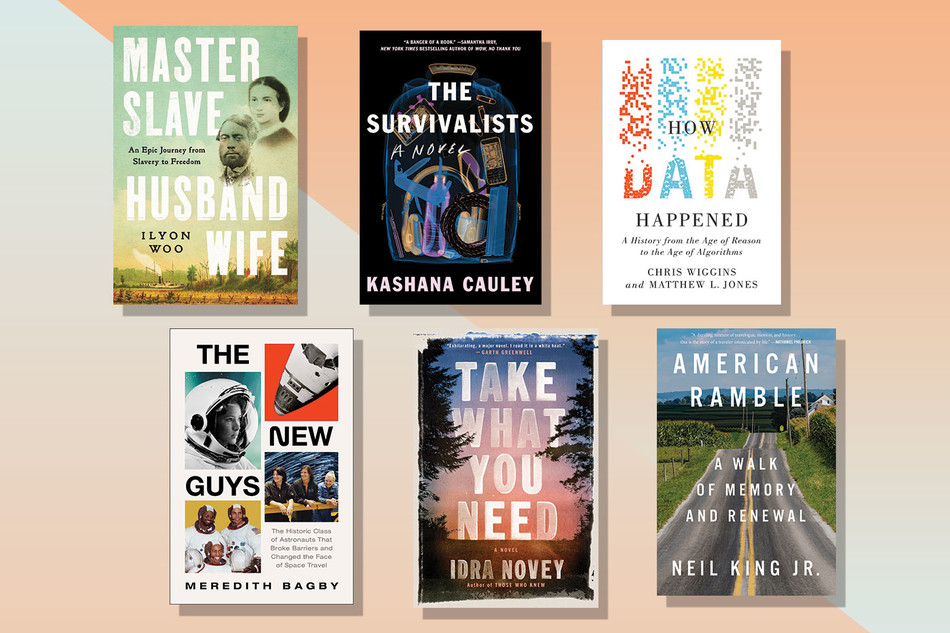Master Slave Husband Wife
By Ilyon Woo ’04GSAS
As dawn broke on December 20, 1848, enslaved couple William and Ellen Craft escaped captivity in Macon, Georgia, and fled to freedom in the North. But what made their journey especially remarkable was that they traveled: out in the open, on trains and on steamships, with the light-skinned Ellen dressed as a man and the darker William posing as “his” slave. The Crafts garnered some celebrity, and their story has been told before, but Ilyon Woo breathes new life into it, relying on exhaustive research to recreate their harrowing journey in astonishing detail.
Take What You Need
By Idra Novey ’00BC, ’07SOA
With a busy New York City life, Leah thinks she’s finally escaped her Appalachian childhood. But then her ex-stepmother Jean dies, leaving Leah a strange collection of giant sculptures. Leah travels back to the Allegheny Mountains to find not only the sculptures but also a young man who has been living with Jean, embracing her as family when Leah could not. In her latest novel, Idra Novey — also a poet and translator — introduces us to a memorable cast of characters who skillfully illustrate the increasingly stark divide between rural and urban America. While all are well-drawn, the star of the show is clearly Jean, a cantankerous sage, who “made art seem like something any obsessive loner who craved it could achieve.”
How Data Happened
By Chris Wiggins ’93CC and Matthew L. Jones
Our world is powered by numbers: data-driven algorithms decide everything from what ads we see online to how we board a flight. But how did we get here? Columbia mathematics professor Chris Wiggins and Columbia history professor Matthew L. Jones argue that the road to data dominance has been much longer than we might have thought. In 2017, they teamed up to teach what has become one of Columbia College’s most popular courses — the history of data science. Here they distill much of that material into a fascinating text, chronicling the way society has collected and used data over the last three centuries and describing what they see as the way forward.
The New Guys
By Meredith Bagby ’00LAW
In 1978, NASA opened its doors to civilians, ushering in a new era of space travel. In doing so, it achieved a number of other firsts — the first American women, Black, Asian-American, and gay astronauts were remarkably all part of the inaugural civilian class. Drawing on the Johnson Space Center’s oral-history project, as well as hundreds of her own interviews, Meredith Bagby tells the inspiring and often heartwrenching story of this group of barrier breakers.
The Survivalists
By Kashana Cauley ’06LAW
Aretha is an ambitious New York lawyer, striving toward partner at a morally questionable “big law” firm while reeling from the deaths of her parents. Then, she meets Aaron, a fellow orphan who seems to get her right away. But Aaron’s world is a little different from Aretha’s. He and his housemates are coffee entrepreneurs — and also gun-toting conspiracy theorists, with a bunker in the backyard of their brownstone. Aretha moves in and begins to question everything about her by-the-book life. Kashana Cauley, a lawyer turned Daily Show writer, showcases her sharp wit in this debut novel, a dark comedy with plenty of insight about race, gender, politics, and the role of guns in modern America.
American Ramble
By Neil King Jr. ’85GS
The road between Washington, DC, and New York City is well-trodden and, most would say, not very interesting. But after a life-altering bout with cancer and a world-altering pandemic, journalist Neil King Jr. decided to slow down and take a closer look. In the spring of 2021, he walked the distance between the two cities — a twenty-eight-day trek that he punctuated with visits to historical landmarks. King is an amiable travel guide, but he also delivers plenty of depth, especially when he deploys his Columbia philosophy training to reflect on his experience. As he writes, “We should go about our days like itinerant archaeologists, kicking at stones and pulling back vines to see what is hidden there.”



